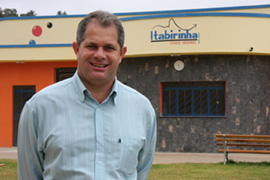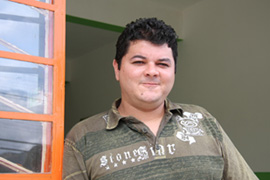Living the American dream in Brazil
How a booming South American economy is luring its expatriates back home.

 |
| Brazil’s returning expatriates and their US dollars are being welcomed with open arms [GALLO/GETTY] |
The small town of Itabirinha, Brazil might seem like the most unlikely place in the world to be benefiting from the US economic downturn.
With a population of 10,000 and located in the remote interior of Brazil, one in every 10 people from Itabirinha live in the US.
But this is quickly changing; this year alone hundreds of people gave up the ‘American dream’ and returned home to re-invest their dollars in the local economy.
Itabirinha represents a microcosm of a much larger reverse migration trend that has been happening in the past year.
Thousands of Brazilian expatriates are being lured back to South America’s largest country thanks to the combination of a poor US economy contrasted with a Brazilian economy that is thriving in a way not seen for decades.
Immigrants living in the US have always sent money back to their families in their home countries, but what is changing now in places like Itabirinha is that Brazilians are themselves coming back to invest in their hometowns.
The ‘American dream’ is now becoming the Brazilian dream for thousands.
Brazilians in the US
The most recent US government census data, collected in 2000, put the number of Brazilian legal residents in the US at 212,636.
Unofficial estimates of all Brazilians in the US – including those without proper immigration documents – puts the number at about 1.1 million.
Many of these Brazilians are re-thinking life in their adopted country for several reasons.
 |
| Amauri Alves Araujo returned to Brazil after spending four years in the US |
The US dollar is at its weakest level against the Brazilian real in decades.
In 2004, every dollar sent home bought approximately four Brazilian reais (R$).
Today one dollar fetches only about one real and 63 cents.
Tighter immigration laws in the US, along with the collapse of comprehensive immigration reform that could have allowed thousands of Brazilians a path to legal status, has also forced many to reconsider life in the US.
Brazilians who bought homes in the US are feeling the housing slump just like everyone else, and many are deciding to give up rather than ride it out.
Booming Brazil
But that is just half the story, because Brazil is currently undergoing an economic revival it has not seen in years.
There is record growth in everything from the Sao Paulo stock market (the largest in Latin America), to new home sales, to discretionary spending.
In short, Brazil is booming and it is not just the wealthy megacities like Sao Paulo and Rio de Janeiro, but also the medium-sized cities.
The thousands returning from the US are hoping for a slice of the Brazilian pie.
| In video | ||
| ||
|
|
Exact numbers of Brazilians leaving the US are hard to come by since few people track those numbers, but most Brazilian community leaders in the US say the number of Brazilians in the reverse migration trend has reached thousands in the past year.
US media outlets have also quoted travel agents in the New York area alone who said that one-way tickets from Kennedy Airport to Brazil are averaging about 150 a day, more than double those of a year ago.
Reaping the benefits
Meanwhile, the small town of Itabirinha is reaping the benefits of people coming back, but it has not been by accident.
 |
| Ferreira, Itabirinha’s mayor, has been actively encouraging the return of expatriates |
The town’s mayor, Aurelio Cezar Donadia Ferreira, travelled to the US last year to meet with 600 people from Itabirinha living in and near Miami, Boston and New York.
He made a simple sales pitch: With the US economy slumping, your future is better put to use in your native Itabirinha and the town has options for you to invest the money you earned in the US.
Ferreira came armed with a research report he commissioned showing the types of small businesses and investment needed in Itabirinha.
“I told the people I met with that whoever had capital to invest of any kind, $100,000, $50,000, $10,000, could return to Itabirinha and create his or her own business,” Ferreira said.
“We had a market for any business they wanted to create, and we are ready to help them, no matter how much they wanted to invest. I made it clear Itabirinha is waiting for them with open arms.”
Business is good
Amauri Alves Araujo is one person who listened to Ferreira speak in a meeting near Miami. Araujo grew up in Itabirinha but left to work in construction in Florida for four years. This year, after listening to Ferreira outline the benefits of coming home, he returned to his hometown for the same reason many others have.
“The stability in the United States crashed. And the dollar has lost so much value,” Araujo said.
“So the money I was making there did not translate into that much in Brazilian currency. It just was not worth it to stay in the US.”
Araujo opened an electrical store in Itabirinha, and business is good.
So good, in fact, that he hopes to open more stores in other neighbouring small towns. His brother, Allan, also a returning immigrant, is using the dollars earned in the US to build a new restaurant.
Ferreira says some 250 people have returned to Itabirinha this year. And 90 per cent of those he met with while in the US expressed an interest in coming back.
“Mayor Ferreira motivated me to come back,” Araujo said.
“He said the town was developing, but that it needed more investment and he would help us if we came back, so I did and I am happy with that decision because I have my family here, and also now my business.”
Creating new jobs
According to city statistics, each person coming back is re-investing on average between $75,000-$80,000 dollars, either with a new business or by the buying or building of new homes.
 |
| Elmer Coimbra grew up in Itabirinha and has now opened one of the few restaurants in town |
The new investments are also leading to the creation of new jobs in the town; Ferreira claims the town has nearly zero unemployment for men.
People are laying bricks for new buildings on nearly every corner in Itabirinha. Fresh coats of paint are on most houses, a symbolic sign of a city renewed. Even the dirt road leading into town is now being paved, a proud moment for many people of the town.
Elmer Coimbra also grew up in Itabirinha but moved to the US and worked as a chef in the Boston area for eight years. He returned to Itabirinha earlier this year and invested his greenbacks in opening one of the few restaurants in town. He now serves about 300 lunches a day and employs eight people.
“Many of these people returning left Brazil five years ago or more without any global perspective,” Ferreira said.
“And now they are coming back here as entrepreneurs to create businesses and opportunities and jobs for others that have not left Itabirinha. The economy of the city improves any way you look at it.”
Larger trend?
It is perhaps too early to know if the reverse migration trend from Brazilians is a sign of a larger trend with other immigrant groups in the US.
So far, Brazil appears to be a unique case in Latin America because the local economy is particularly strong.
Anecdotal evidence this year indicates that more Brazilians are leaving the US and this fact is challenging the assumptions that the US would be the best place to become an entrepreneur.
As the trend plays out in small Brazilian towns like Itabirinha in the months and years to come, people like Araujo, the new business owner in town, says he has no regrets about coming back.
“I am living my America dream,” he said. “I am just living it here, and not back in America.”
